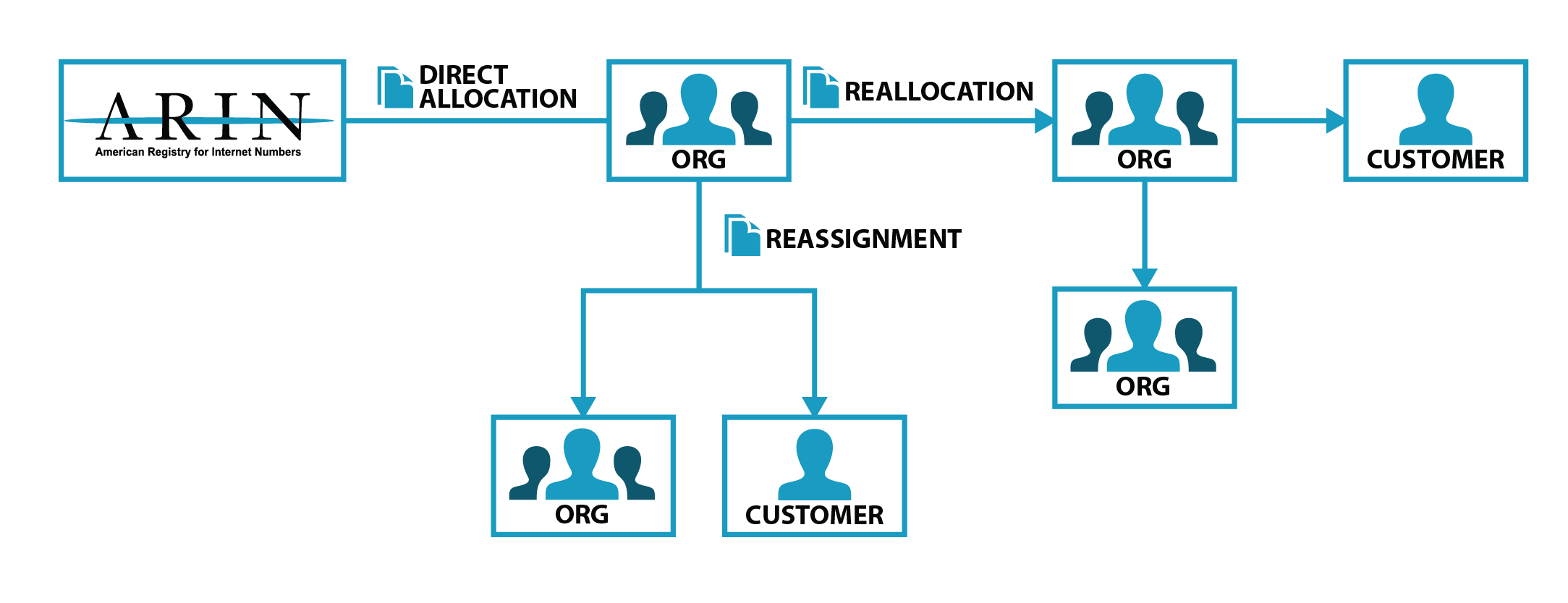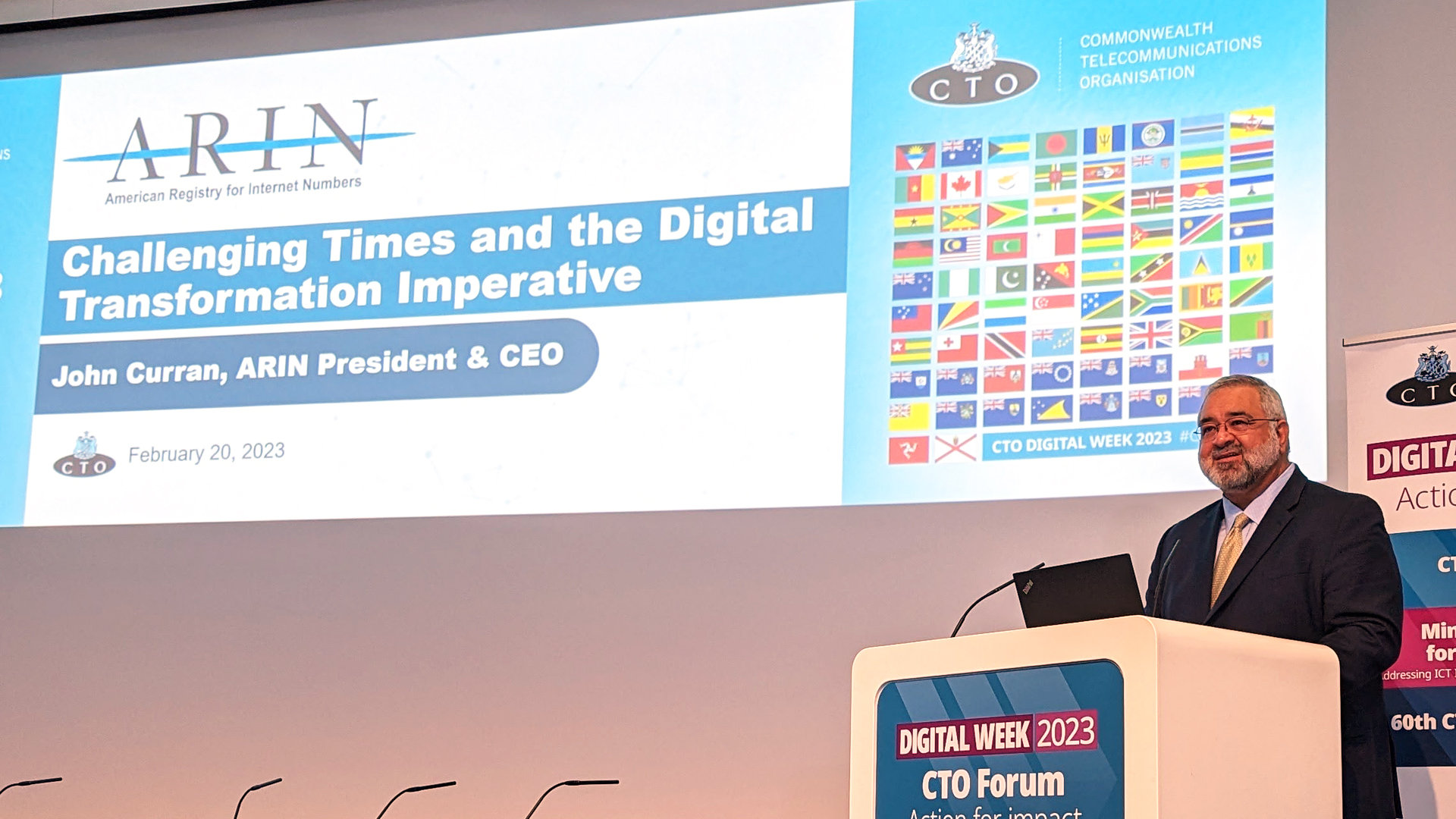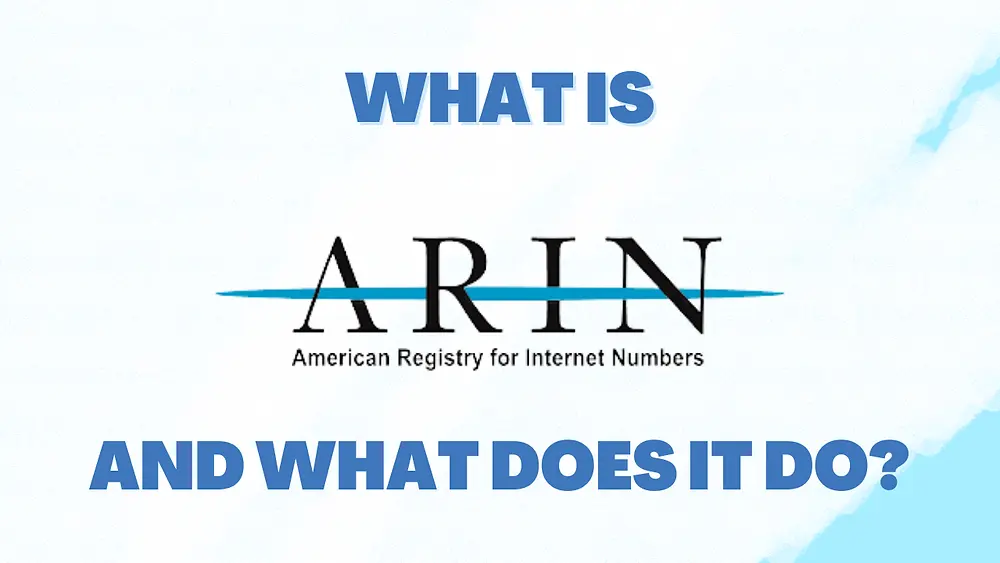- ARIN (American Registry for Internet Numbers) is a non-profit organization responsible for the management and distribution of IP addresses and Autonomous System Numbers (ASNs) in the North American region.
- ARIN facilitates global internet connectivity, addressing emerging challenges like IPv6 adoption, IoT growth, and cybersecurity, while promoting collaboration within the internet governance community.
The worlds Regional Internet Registries (RIRs) are responsible for providing Internet Service Providers (ISPs) and telecom companies with IP addresses and other internet ‘numbers’ so their customers can connect to the internet. There are five RIRs: ARIN, RIPE, APNIC, LACNIC and AFRINIC. ARIN is responsible for North America, RIPE is responsible for the European region, LACNIC is responsible for Latin America America region and AFRINIC is responsible for the Africa region. The allocation of IP addresses and AS numbers for countries in the Asia Pacific region is managed by APNIC. Registries can also exist under the RIR, such as National registries (NIR) and General registries (LIR). These registries receive Internet addresses and numbers from APNIC and can assign them to their subordinates.
- What is ARIN and why does it matter?
- ARIN’s role in internet governance
- The importance of ARIN in ensuring a functional internet
- ARIN and the community: Collaboration for a better internet
- The future of ARIN
- ARIN’s commitment to security and privacy
- ARIN’s key role in shaping the future of internet governance
- FAQs: What is ARIN?
Also read: What is APNIC? Inside the backbone of Asia’s internet
Also read: ARIN launches consultation on Reg-RWS improvements
What is ARIN and why does it matter?
In the ever-evolving landscape of the internet, one often overlooked but crucial entity is the American Registry for Internet Numbers (ARIN). ARIN is responsible for the allocation and management of Internet Protocol (IP) addresses in North America, parts of the Caribbean, and sub-Saharan Africa. This organization plays an essential role in ensuring that every device connected to the internet can communicate with each other effectively.
The primary task of ARIN is to manage and distribute IP addresses, ensuring that every user, website, or device has a unique identifier that allows it to be found on the vast global network that is the internet. But ARIN’s influence goes far beyond simply assigning numbers. It is a part of a larger system of regional internet registries (RIRs) that manage the internet’s technical resources. ARIN plays a key role in internet governance, which affects everything from the flow of data to the security of online communications.

ARIN’s role in internet governance
ARIN is one of the five RIRs worldwide. The five RIRs—ARIN, RIPE NCC (Europe, the Middle East, and parts of Central Asia), APNIC (Asia Pacific), LACNIC (Latin America and the Caribbean), and AFRINIC (Africa)—work together to coordinate the distribution of IP addresses globally. This decentralized structure ensures that no single organization or country has control over the entire internet’s addressing system.
What is an IP address?
To understand ARIN’s role, it’s helpful to first grasp what an IP address is. An IP address is a unique identifier assigned to every device that connects to the internet. Much like a home address enables you to receive mail, an IP address enables data to reach its correct destination over the internet. There are two main types of IP addresses: IPv4 (the older version) and IPv6 (the newer version).
With the rapid expansion of the internet and the increasing number of connected devices, IPv4 addresses began to run out. This shortage spurred the adoption of IPv6, which allows for an exponentially larger number of IP addresses. ARIN manages both IPv4 and IPv6 addresses, ensuring fair and efficient distribution.
ARIN and the allocation of IP addresses
The allocation of IP addresses is not a simple process. ARIN allocates large blocks of IP addresses to internet service providers (ISPs), corporations, and other entities that require them. These organizations, in turn, assign smaller blocks of IP addresses to individual users and devices.
While ARIN manages IP address allocation, it also works to ensure that network operators use these addresses efficiently. This includes preventing hoarding of unused IP addresses and making sure that ARIN distributes address space based on need.

The importance of ARIN in ensuring a functional internet
ARIN’s work ensures that the internet continues to function smoothly and that every device can connect to the network without conflict. By managing IP address distribution, ARIN prevents issues like address duplication, which could cause communication breakdowns between devices.
Moreover, ARIN works to maintain the integrity of the internet’s routing system. This system ensures that data sent over the internet reaches its destination by using a method known as routing. Routing is the process of determining the best path for data to travel across the internet. ARIN’s role in IP address allocation directly impacts the efficiency and reliability of the internet’s routing system.
Through global cooperation and community engagement, ARIN plays a critical role in shaping the internet’s infrastructure, ensuring that it remains secure, scalable, and accessible to all.
ARIN Executive Leadership Team
ARIN’s role in IPv6 adoption
One of the most pressing challenges facing ARIN today is the global adoption of IPv6. As mentioned earlier, IPv4 addresses are running out, and IPv6 is the solution to this problem. IPv6 provides a vastly larger pool of IP addresses, ensuring that the internet can continue to grow without running out of unique identifiers.
ARIN plays a central role in encouraging and facilitating the transition to IPv6. This involves educating businesses and individuals about the benefits of IPv6, providing technical support, and assisting with the implementation of IPv6 networks. ARIN has worked with network operators to make the transition as seamless as possible, ensuring that the internet continues to function effectively as it evolves.

ARIN and the community: Collaboration for a better internet
ARIN’s work goes beyond just managing IP addresses. The organization is also deeply committed to fostering collaboration and dialogue among stakeholders in the internet ecosystem. ARIN regularly holds meetings and events where industry leaders, policymakers, and technical experts can come together to discuss issues related to internet governance, IP address allocation, and the future of the internet.
These gatherings provide a platform for people to share best practices, exchange ideas, and work together to solve the challenges facing the internet. ARIN’s commitment to community involvement is a key part of what makes it such a trusted and effective organization in the realm of internet governance.
Also read: Unlocking the potential of raw sockets in networking
The future of ARIN
As we look toward the future, ARIN’s role will continue to evolve. The increasing adoption of IoT (Internet of Things) devices, smart cities, and 5G networks will place new demands on IP address allocation. In response, ARIN is already planning for the future, ensuring that the internet’s infrastructure can handle the exponential growth in connected devices.
The ongoing transition to IPv6 is also expected to continue, and ARIN’s leadership in this process will be crucial in ensuring that the internet can continue to grow without facing technical limitations. As we move into the next phase of internet evolution, ARIN will remain a key player in ensuring that the infrastructure supporting the digital world remains robust, secure, and efficient.
Also read: ARIN to enhance security services with RPKI and IRR Integration

ARIN’s commitment to security and privacy
Beyond its technical responsibilities, ARIN is also focused on internet security and privacy. The organization plays a role in ensuring that IP address allocations are secure and that there are no vulnerabilities in the system that could be exploited by malicious actors. ARIN has implemented measures to protect the integrity of its database and to prevent the abuse of IP address resources.
In addition to its technical security efforts, ARIN is also focused on educating the internet community about the importance of cybersecurity. By collaborating with other organizations, ARIN works to raise awareness about threats like DDoS (Distributed Denial of Service) attacks, ransomware, and data breaches, which can undermine the reliability of the internet.

ARIN and the Global Internet Ecosystem
As the internet continues to grow and evolve, ARIN’s role in the global ecosystem becomes even more significant. ARIN works closely with other RIRs, governments, and international organizations to ensure that the internet remains open, accessible, and secure. Its efforts are crucial to the continued development of a global, interoperable network that connects billions of people and devices.
In addition to its technical work, ARIN also plays a role in policy development. By engaging with governments, industry stakeholders, and the wider community, ARIN helps shape the policies that govern how IP addresses are allocated and how the internet is managed. This involvement ensures that ARIN’s work is aligned with the needs and priorities of the global internet community.
Also read: ARIN seeks volunteers for 2025 Fellowship Selection Committee
ARIN’s key role in shaping the future of internet governance
ARIN is an integral part of the internet’s infrastructure, ensuring that the global network continues to function smoothly and efficiently. By managing IP address allocation, facilitating the transition to IPv6, and fostering collaboration among stakeholders, ARIN plays a vital role in shaping the future of the internet. As we look ahead, ARIN’s leadership in addressing emerging challenges like IPv6 adoption, IoT connectivity, and cybersecurity will be crucial. Its commitment to community engagement and global cooperation ensures that ARIN will continue to be a trusted and essential organization in the ever-changing world of internet governance.
ARIN ensures the internet’s continued growth by managing IP address allocation and supporting the transition to IPv6, enabling a connected world for generations to come.
Mario Di Paolo, Head of NaaS and Mobile Products at Telefónica Global Solutions
FAQs: What is ARIN?
ARIN (American Registry for Internet Numbers) is a nonprofit organization responsible for managing and distributing Internet Protocol (IP) addresses and related resources across North America, parts of the Caribbean, and sub-Saharan Africa. It ensures efficient and fair allocation of IP addresses to internet service providers (ISPs), businesses, and other organizations.
ARIN plays a vital role in the smooth functioning of the internet by ensuring that devices can communicate with each other using unique IP addresses. It also manages the transition from IPv4 to IPv6, helping to address the shortage of available IP addresses and support the growing demand for connected devices.
IPv4 is the older version of the Internet Protocol and provides a limited number of IP addresses. With the rapid expansion of the internet, IPv4 addresses are running out. IPv6, the newer version, offers a vastly larger pool of addresses, allowing for continued growth of the internet and the increasing number of connected devices.
ARIN allocates large blocks of IP addresses to internet service providers (ISPs), corporations, and other organizations that require them. These entities, in turn, assign smaller blocks to end-users, businesses, and devices. ARIN ensures that IP address distribution is done fairly and that address space is used efficiently.
To obtain an IP address from ARIN, you typically need to be an organization or service provider with a legitimate need for IP resources. ARIN provides resources through a request process that involves demonstrating the need for IP addresses. Smaller organizations often get their IP addresses through their ISPs, while larger organizations may directly request blocks from ARIN.

